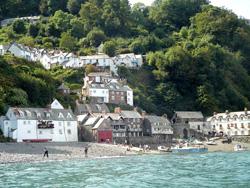
Places to Visit in Bideford, Devon



Clovelly
Clovelly Visitor Centre
Bideford
Devon
EX39 5TA
Tel: 01237 431781
Email: click here
Clovelly online: information and bookings
The picturesque, ancient, fishing village of Clovelly is uniquely special in that it has no cars and no individually owned houses. Its flower-strewn cottages "tumble like a waterfall" down a cleft in the 400' cliff along cobbled streets to the tiny working port and C14th quay. It combines a rich environment and an historic village, with so much to see and explore.
Glorious views over the coast of North Devon, stories of cannibals and unsolved murders, an ancient Iron Age fort, Norman church, donkeys and links to the Armada, Charles Kingsley, William Turner, Charles Dickens and Rex Whistler, all help to make this a unique experience.
A visit to Clovelly allows you to step back from the modern world into a still thriving community, where the buildings have remained unchanged for centuries, where history straddles three millennia and whose people offer a warm Devon welcome to visitors.
The famous cobbled street, know as 'Up-a-long' or 'Down-a-long', was built of stones from the beach. Visitors can only gain access to the village on foot as no traffic is allowed. Man-powered sledges transport all goods to the village, from groceries to furniture. Donkeys used to be the main form of transport for centuries, but they can now be seen in the stable yard or in the village posing for photographs.
The author, Charles Kingsley (1819-1875), lived here as a child and returned many times as an adult. His description of the village has hardly changed after all this time: "Suddenly a hot gleam of sunlight fell upon the white cottages, with their grey streaming roofs and little scraps of garden courtyard and lighting up the wings of the gorgeous butterflies which fluttered from the woodland down to the garden". He wrote 'Westward Ho!' here and the village itself inspired him to write 'The Water Babies' and 'The Three Fishers'. There are two museums in the village, one of which is dedicated to him. The other is Fisherman's Cottage, a time capsule of the life of a Clovelly fisherman in the C19th.
Kingsley's contemporary, Charles Dickens (1812-1870), also visited Clovelly and described it in 'A Message from the Sea' (1860) in which the village was called 'Steepways'. "The village was built sheer up the face of a steep and lofty cliff. There was no road in it, there was no wheeled vehicle in it, there was not a level yard in it. From the sea-beach to the cliff-top two irregular rows of white houses, placed opposite to one another and twisting here and there, and there and here, rose, like the sides of a long succession of stages of crooked ladders".
Explore the winding side alleys of the village to discover treasures such as little chapels, enchanting cottage gardens and other nooks and crannies.
Once a bustling fishing port, Clovelly was renowned for its herring and mackerel and, although fishing has declined, it is still very much a part of village life. Clovelly is also today famous for its lobsters (and crabs), which are sent away as far afield as France and Spain. In past centuries, the coastline was occupied with smuggling, wrecking and piracy and was notorious for shipwrecks, so since 1870, Clovelly has also had its very own lifeboat.
Clovelly offers breathtaking scenery and lengthy walks along the cliff tops. Hobby Drive, built after the Napoleonic wars to give employment to Clovelly's returning soldiers, winds its way through woods and offers superb views of both Clovelly harbour and Bideford Bay. Walking the other way takes you along the dramatic North Devon stretch of cliffs to Hartland Point, taking in the little carved shelter of Angel's Wings and the newly restored Summerhouse with its magnificent view over Mouth Mill Cove, once the haunt of smugglers.
There is a lot more to do and see besides. Watch skilled craftsmen working in the converted stable yard, creating beautiful silks (including the designs of Rex Whistler, once a frequent visitor to the ancient manor house of the estate, Clovelly Court) and pottery. You can also visit Clovelly Court Victorian kitchen gardens (included in the admission charge) and see its splendid herbaceous borders and magnificently restored Victorian glasshouses. It lies adjacent to the C13th parish church of All Saints where generations of the village are buried.
You are also welcome to picnic on Mount Pleasant with its beautiful panoramic view across Bideford Bay.
The Red Lion Hotel offers delicious lunches and dinners, both inside or as a takeaway out in the harbour. There is also a Quay Shop that offers takeaways to enjoy on the quay while watching the harbour traffic come and go. The modest admission charge to Clovelly covers parking, the must-see audiovisual film of the village history, best seen before you visit the village, entry to the two museums, Clovelly Court Gardens and a contribution to the preservation of this very special private estate.
Clovelly Visitor Centre
Tel: + 44 (0)1237 431781
email: visitorcentre@clovelly.co.uk
The Red Lion
Tel: 01237 431237
email: redlion@clovelly.co.uk

In case of alteration, please check prices, opening times and any specific important information before booking or visiting


 www.historic-ireland.com
www.historic-ireland.com